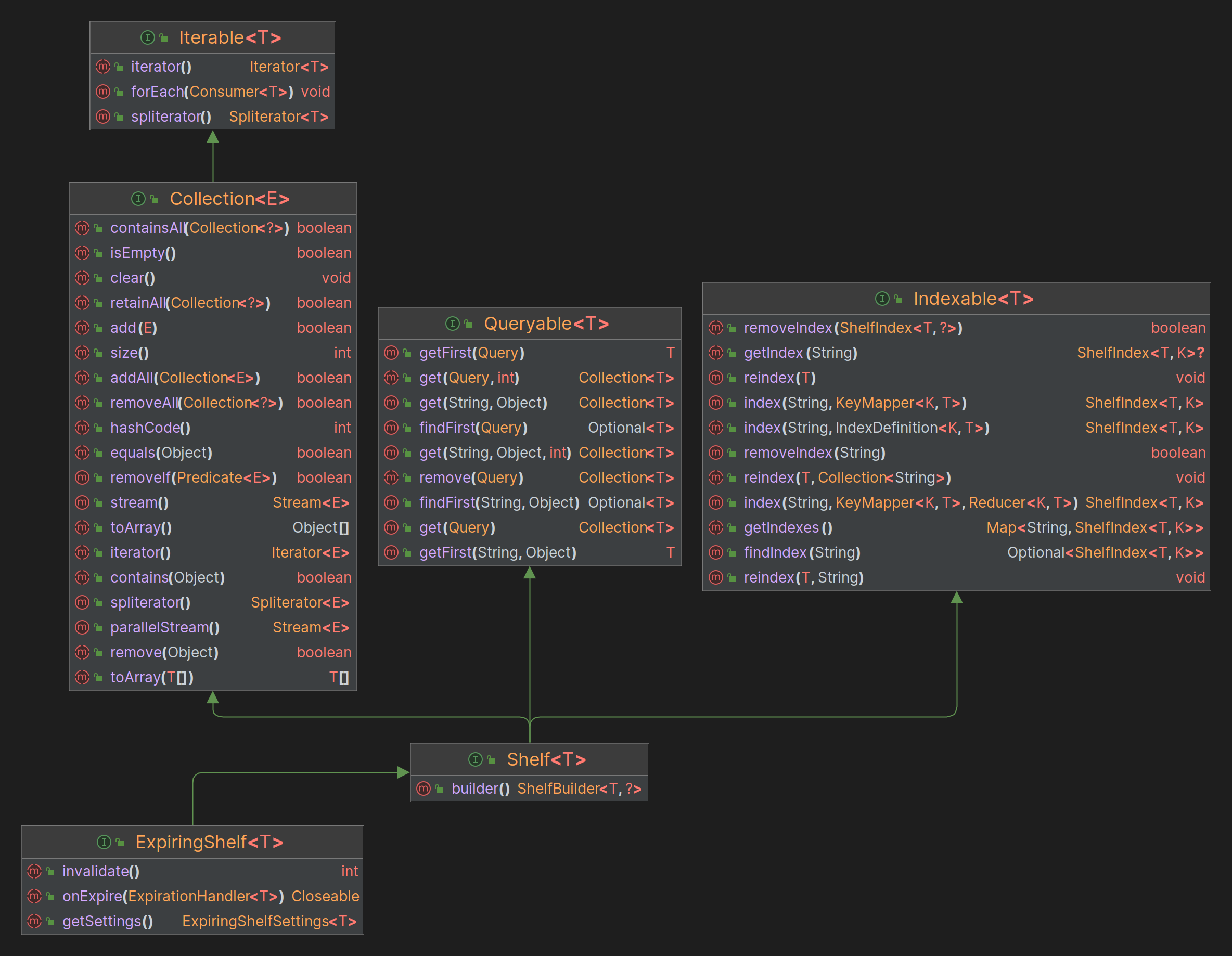This library gives you in memory database that you can use as a cache layer between db -> application
It can be also used in other scenarios where you need to store data by indexes and retrieve it by them.
This is a complete recode of previously forked memory-store
Shelftor is hosted at maven central.
To add it to your dependencies follow the guide depending on your build tool
<dependency>
<groupId>dev.oop778.shelftor/groupId>
<artifactId>shelftor-api/shelftor-core</artifactId>
<version><version></version>
</dependency>
implementation 'dev.oop778.shelftor:shelftor-api/shelftor-core:<version>'Shelftor comes with a very powerful querying system, it gives you the flexibility to adapt to any database. And can be used a query system for database of your use with some adaptation.
// Let's create a simple indexed query by username=OOP_778
Query.where("username", "OOP_778");
// Now Let's merge it with another query that is indexed by age=20
Query.where("username", "OOP_778").and("age", 20);
// Now let's say we want to find two users with username=OOP_778 and username=OOP_779
Query.where("username", "OOP_778").or("username", "OOP_779");
// That's it, the query system is simple yet powerfulShelftor comes with 2 types of shelfs that you can use, let's dig deeper into them.
// Default shelf is a non expiring one
Shelf.<User>builder()
// By default shelftor uses identity hashes, but you can change it to use hashcode instead
.hashable()
// By default shelftor collection choice is non concurrent to avoid any performance hit when used on a single thread environment
// But you can change it to be concurrent if you want to use it in a multi threaded environment
.concurrent()
// By default shelftor uses strong references, meanining that it won't allow GC to run on it's values,
// You can change that to weak references using
.weak()
// Build the shelf
.build()
// Expiring shelf is a shelf that expires it's cache after specific demands are met
Shelf.<User>builder().expiring()
// All options from the default shelf are available here
// By default shelftor expiring shelfs do expiration when you fetch values from it, but you can change that to be done in a
// background thread
.expireCheckInterval(long interval, TimeUnit unit)
// You need to define expiring policies for values to be expired
// Wel'll talk about expiring policies later
.usePolicy(ExpiringPolicy policy)Shelftor Expiring shelf comes with 2 expiring policy types ExpiringPolicy and ExpiringPolicyWithData
In simple words ExpiringPolicy does not store any data on each value and does checks based on the value itself
whilst ExpiringPolicyWithData stores data on the values to know when to expire.
Example of that is TimedExpiringPolicy located at api/src/main/java/dev/oop778/shelftor/api/expiring/policy/implementation/TimedExpiringPolicy
You can define indexes of two types collection and single Let's say we have a Student object that has name (String) & grades (Collection)
record Student(String name, Collection<Integer> grades) {}
// Now let's create a shelf for students
Shelf<Student> shelf = Shelf.<Student>builder()
.build();
// Now let's define an index for name
shelf.index("name", Student::name);
// Now let's define an index for grades
shelf.index("grades", IndexDefinition.withKeyMappings(Student::getGrades))
// Now let's create two stdudents
Student student = new Student("OOP_778", List.of(5, 6, 7));
Student student2 = new Student("OOP_779", List.of(5, 6, 7));
// Now let's put them in the shelf
shelf.add(student);
shelf.add(student2);
// Now we can fetch them by grade of 5
shelf.get("grades", 5); // This returns us both students
// Now let's say one student grades changes
student.grades().add(8);
// We need to reindex that student
shelf.reindex(student, "grades");
// That's it, now you should be able to properly understand the full power of shelftor


